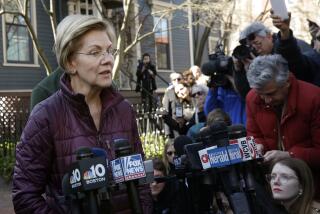White House still avoiding calling healthcare mandate a tax
- Share via
President Obama’s healthcare law owes its survival to the Supreme Court’s finding – authored by Chief Justice John Roberts – that the act’s individual mandate is, in fact, a tax, and therefore constitutional.
But while the White House cheered the ruling, the administration is assiduously avoiding the T-word.
White House Chief of Staff Jack Lew, appearing on ABC’s”This Week” with George Stephanopoulos, sought to characterize the mandate as a penalty, not a tax.
“For Americans who buy health insurance or who can’t afford it and get it through a government program, there is no penalty,” Lew said. “It covers 99% of the American people. In Massachusetts where they had a plan like this under Gov. Romney, 1% did not take insurance, and they paid the penalty.”
“Let’s be clear about who that 1% is,” Lew continued. “Those are people who can afford health insurance who choose not to buy it and then, when they get sick, they go to the hospital and the costs gets spread amongst all the people paying for insurance. So the law set it up as a penalty for people who make that choice. The court found it constitutional. Frankly, what you call it is not the issue.”
Lew would not budge from calling the mandate a penalty, despite Stephanopoulos’ repeated attempts to get Lew to acknowledge Roberts’ formulation of the mandate as a tax.
The chief of staff asserted that the law’s survival was a net political gain for the president, even though the legislation’s unpopularity contributed to widespread Democratic losses in the 2010 midterm elections.
“If you look at where we are now versus where we were a couple of years ago, the American people are starting to experience the benefits of this law,” Lew said, adding that “the American people do not want to go back to a divisive debate about healthcare. The Congress passed a law. The Supreme Court ruled it constitutional. The arguments that are being made now to reopen that fight are the wrong arguments.”
Ultimately, Lew said, the election will not be a referendum on the popularity of healthcare reform.
“I think this election will be about the economy,” Lew said. “The American people are focused on the economy. They’re asking the question what are we doing to get it going.”
Also appearing on the program was Rep. Paul Ryan, a Republican from Wisconsin and the chair of the House Budget Committee. Ryan, who often serves as a surrogate for Mitt Romney and is considered a vice-presidential contender, said the Supreme Court’s decision now makes a Romney victory in November all the more crucial for opponents of the healthcare law.
“Now, the stakes of this election could not be higher, George,” Ryan said. “I’m very disappointed but we’re not deterred. We think we can still repeal this law if we win this election. And that’s basically what the chief justice said; it’s now up to the American people. It’s beyond Congress, the president and even the Supreme Court. The American people will be the judge and jury of this law come November.”
[For the Record, 11:44 a.m. PST July 1: An earlier version of this post said that there is no penalty for those who can afford healthcare and recieve it through the government. Actually, he said that was the case for those who can’t afford healthcare.]
More to Read
Get the L.A. Times Politics newsletter
Deeply reported insights into legislation, politics and policy from Sacramento, Washington and beyond. In your inbox twice per week.
You may occasionally receive promotional content from the Los Angeles Times.











